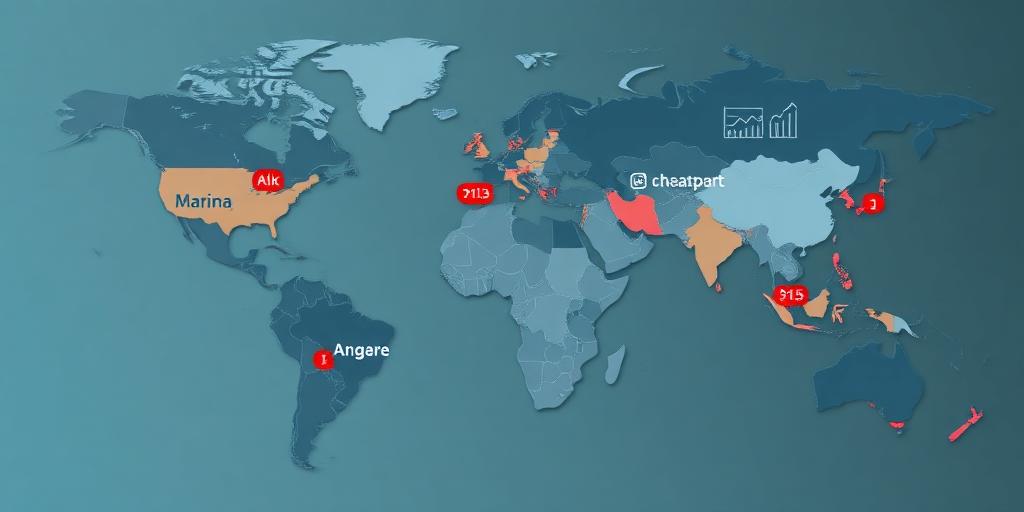Analyzing Geopolitical Risk for Businesses
In an increasingly interconnected world, businesses are no longer insulated from geopolitical events. Understanding and managing geopolitical risk is crucial for strategic decision-making, investment, and operational stability. This article provides a comprehensive analysis of geopolitical risk and offers strategies for businesses to navigate this complex landscape.
What is Geopolitical Risk?
Geopolitical risk refers to the potential impact of political events and developments on businesses. These risks can arise from various sources, including:
- Political Instability: Regime changes, civil unrest, and conflicts can disrupt supply chains, impact market access, and endanger assets.
- International Relations: Trade wars, sanctions, and diplomatic tensions can affect trade flows, investment, and business partnerships.
- Regulatory Changes: New laws, policies, and regulations can alter the operating environment for businesses, impacting compliance and profitability.
- Resource Nationalism: Governments may seek to increase control over natural resources, affecting companies involved in extraction and processing.
- Cybersecurity Threats: Geopolitical tensions can lead to state-sponsored cyberattacks targeting businesses and critical infrastructure.
Why is Geopolitical Risk Important for Businesses?
Geopolitical risks can have significant consequences for businesses:
- Financial Losses: Disruptions to operations, supply chains, and markets can lead to decreased revenue and increased costs.
- Reputational Damage: Association with controversial regimes or involvement in unethical practices can harm a company's reputation.
- Legal Liabilities: Non-compliance with sanctions, export controls, and other regulations can result in fines and legal action.
- Operational Challenges: Political instability and conflicts can make it difficult to operate facilities, transport goods, and ensure the safety of personnel.
- Strategic Miscalculations: Failure to assess geopolitical risks can lead to poor investment decisions and missed opportunities.
Strategies for Managing Geopolitical Risk
Businesses can take several steps to manage geopolitical risk effectively:
- Risk Assessment: Conduct thorough risk assessments to identify potential threats and vulnerabilities in different regions.
- Scenario Planning: Develop scenarios to anticipate the impact of different geopolitical events on your business.
- Diversification: Diversify supply chains, markets, and investments to reduce reliance on any single country or region.
- Intelligence Gathering: Monitor political developments and gather intelligence from reliable sources to stay informed.
- Stakeholder Engagement: Engage with governments, industry associations, and other stakeholders to understand their perspectives and concerns.
- Compliance Programs: Implement robust compliance programs to ensure adherence to sanctions, export controls, and other regulations.
- Cybersecurity Measures: Strengthen cybersecurity defenses to protect against state-sponsored cyberattacks.
- Insurance Coverage: Obtain political risk insurance to protect against losses due to political events.
- Contingency Planning: Develop contingency plans to respond to crises and disruptions, including evacuation plans for personnel.
Tools for Analyzing Geopolitical Risk
Several tools and resources are available to help businesses analyze geopolitical risk:
- Risk Indices: Global risk indices provide quantitative assessments of political and economic risks in different countries.
- Consulting Firms: Geopolitical risk consulting firms offer expert analysis and advice on geopolitical trends and their impact on businesses.
- Government Agencies: Government agencies provide information on political risks and security threats in different regions.
- Academic Research: Academic institutions conduct research on geopolitical issues and their implications for business.
- Online Resources: Numerous online resources provide news, analysis, and data on geopolitical risks.
Conclusion
Geopolitical risk is an inherent part of the global business environment. By understanding the nature of these risks and implementing effective management strategies, businesses can protect their assets, operations, and reputation. Staying informed, diversifying operations, and engaging with stakeholders are essential for navigating the complexities of the geopolitical landscape and achieving long-term success.









